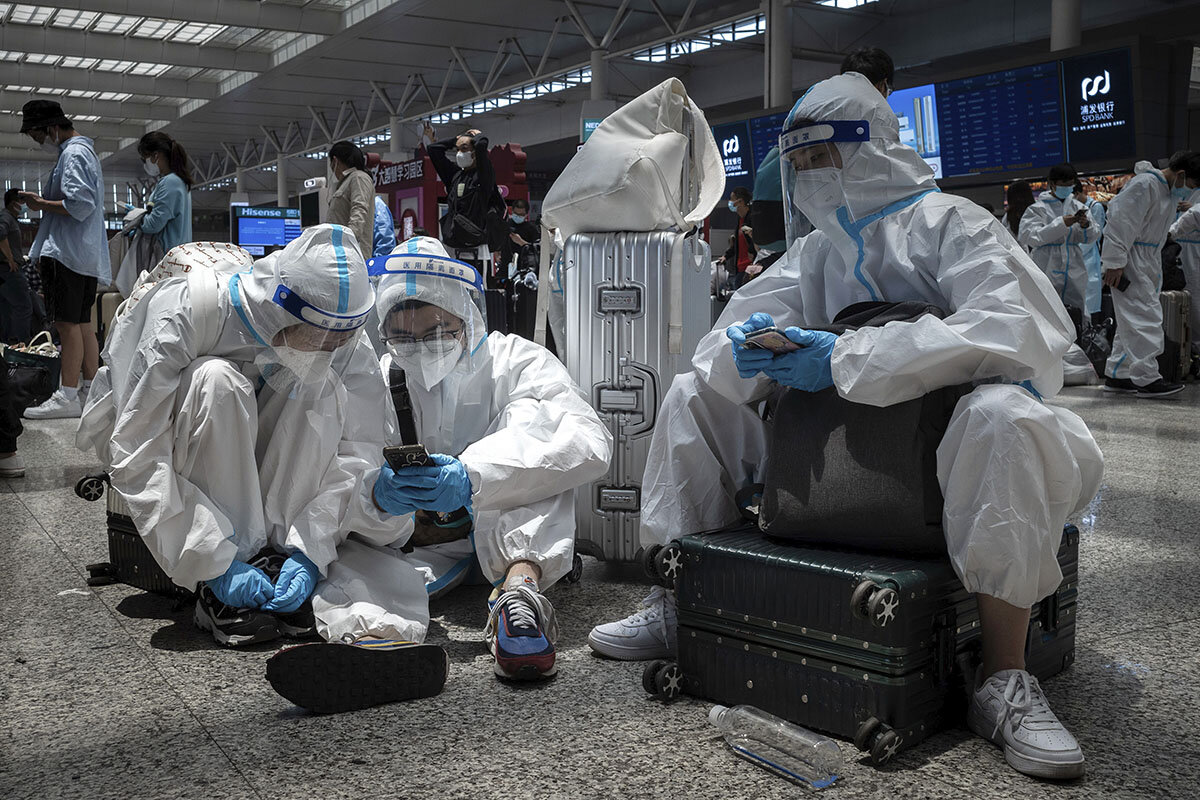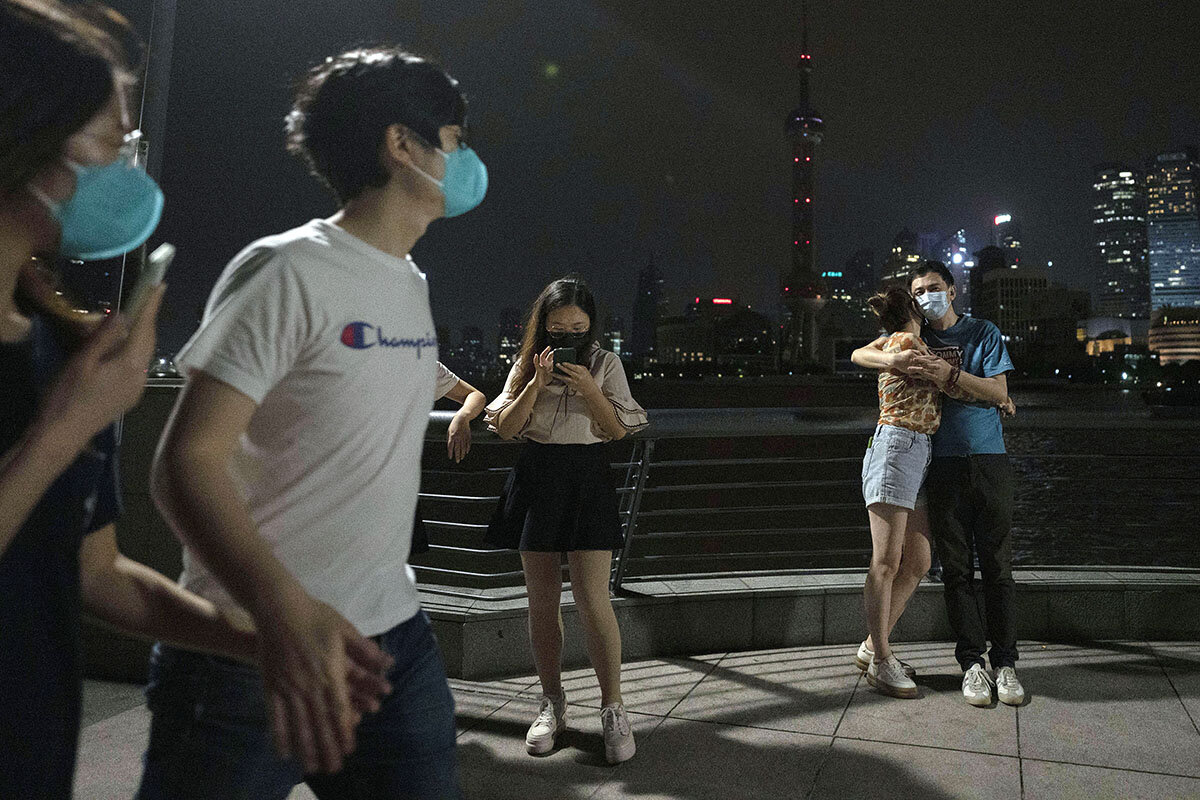‘Run philosophy’: Why ‘zero COVID’ has young Chinese eyeing emigration
Loading...
| Beijing
Through deserted Shanghai streets, some people silently pedaled bicycles, dragging roller bags with one hand or balancing luggage precariously on front wheels. Others fled the city’s lockdown on foot, wearing full hazmat suits and carrying possessions stuffed into plastic bags. They lined up for at least a mile on the access road to Hongqiao Railway Station, bedraggled refugees out of place against the backdrop of manicured boulevards and futuristic high rises. Among the crowd was Carol, a writer.
She recalls surveying the scene in May, shocked by how the ultramodern, cosmopolitan city she’d viewed as a splendid castle had transformed overnight into a place of mass deprivation.
“After this experience in Shanghai, everyone feels we aren’t living in a palace after all, but in a mud-brick house with a thatched roof,” says Carol, who spent more than two months confined to her apartment block with limited food during the country’s biggest COVID-19 outbreak. A Chinese citizen, she asked to use only her English name to protect her identity.
Why We Wrote This
A story focused onStrict COVID-19 lockdowns, and the experience of having their liberties stripped away, have changed the perspective of some young Chinese people on their country. Once willing to sacrifice degree of freedom for economic security, many are now rethinking their futures.
Similar scenes of exodus have played out across the city of 25 million people in recent days and weeks. For many urban, educated millennials like Carol, the lockdowns and quarantines imposed in Shanghai and dozens of cities nationwide have been a traumatic, paradigm-shifting ordeal that has shaken their sense of security. People have fled Shanghai in droves, and now some are considering leaving China altogether.
“The middle-class group expected a decent life,” says Chen Daoyin, a political scientist and former associate professor at the Shanghai University of Political Science and Law. “Before they exchanged freedom for security, but now they have neither freedom nor safety.”
What struck Carol about the lockdown in Shanghai was that no one could protect themselves. “This thing is universal – your freedom of residence and freedom of travel will be restricted. ... All the people are suffering,” she says from her hotel room in a neighboring province. No matter how much money you have or how big your house is, she adds, “you may get a knock on the door and be taken away in the middle of the night.”
Concerned that China’s strict zero-COVID-19 controls will further encroach on basic freedoms and lead to economic and social stagnation, Carol and many of her peers are exploring contingency plans to move overseas.
Carol, who has never lived abroad before, plans to work harder and earn more. “If I have enough money,” she says, “I will go.”
Running away
When Joanna returned to Shanghai three years ago after graduating from college in the United States, she expected to live in China for the rest of her life. A two-month lockdown changed her mind.
“This exceeded my worst predictions,” says the Shanghai-based media worker, asking to withhold her last name to protect her identity. Her goal now is to secure permanent residency in another country, while keeping her Chinese citizenship. “I want that option,” she says, to avoid the “terrifying” feeling that she is trapped in China.
China has allowed millions of its youth to study abroad in recent decades, but the majority have returned home, anticipating they will have better career opportunities here. Yet as the stringent COVID-19 policy exacts a rising economic and social toll, including high urban unemployment, some returned students like Joanna are again looking outward.
Joanna’s main concern is that the zero-COVID-19 policy, while it has succeeded in keeping cases and deaths in China low, is no longer economically feasible. Official figures show China’s economy contracting in recent months, with retail sales and industrial production declining. “If you keep suppressing people’s morale, everyone loses their desire to consume,” she says.
Even since Shanghai mostly reopened June 1, new outbreaks have led authorities to impose fresh lockdowns, creating concerns about an endless cycle of easing and restrictions. More than 1 million people remain confined at home or in quarantine facilities.
Meanwhile, online discussions about “running away from China” have surged. Chinese netizens created a word for it – runxue, or “run philosophy,” a play on words using a Chinese character that sounds like “run” in English.
“It reflects a kind of escapism psychology – people choosing to run away from this place,” says Dr. Chen.
On WeChat, China’s top social media app, Chinese users searched for the term emigration more than 100 million times on a single day in May, according to data released by the company. Emigration has also been a popular topic on China’s Twitter-like social media platform, Weibo, and millions have viewed a question about “run philosophy” on Zhihu, China’s version of Quora.
Users of GitHub, the world’s largest open-source platform for software, set up a repository that is gathering detailed strategies and tips on how to emigrate from China.
“To ‘run’ is a kind of risk aversion,” says Joanna. “Many people are thinking about it. They may not have pulled the trigger, but if things continue to go badly, I believe many people will take practical actions.”
Exit strategy
Allen Ai, a Chinese accounting student in Italy, left China a year ago after losing his job during the pandemic. He’s now fielding messages from contacts back home asking him for advice on moving abroad.
Yet even as the COVID-19 restrictions are pushing some young people to try to emigrate, Chinese authorities are imposing tighter controls on those attempting to leave.
Citing pandemic prevention requirements, the National Immigration Administration announced last month that it will “strictly restrict non-essential exit activities of Chinese citizens.” Last year, it said it would suspend issuing passports to people with “non-urgent” reasons for leaving the country.
China is unlikely to lift such overseas travel restrictions as long as it maintains the zero-COVID-19 policy, which is currently here to stay, experts say.
Ma Xiaowei, head of the National Health Commission, wrote in the Communist Party publication Qiushi on May 16 that China is planning to set up large numbers of booths for regular COVID-19 testing in all provincial capitals and cities with more than 10 million people, while also creating permanent quarantine centers. The goal is to maintain COVID-19 prevention while reducing disruptions to normal life – an approach that showed better results in Beijing recently.
“Mass testing, makeshift shelters, and green code for travel – this may be the status in China for the next three-to-five, or five-to-10 years,” Dr. Chen says, referring to the health code system that tracks each individual’s COVID-19 risk status.
As for Mr. Ai, he’s seeking permanent resident status in Italy, where he expects to have more opportunities. “I think I made a correct decision,” he says. “If I stay in China, I don’t know what I can do.”








